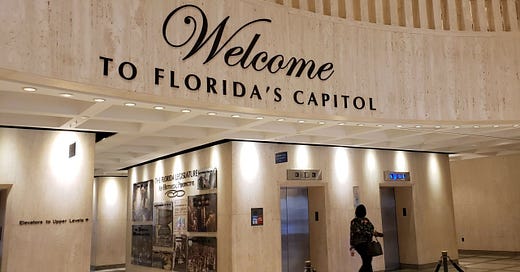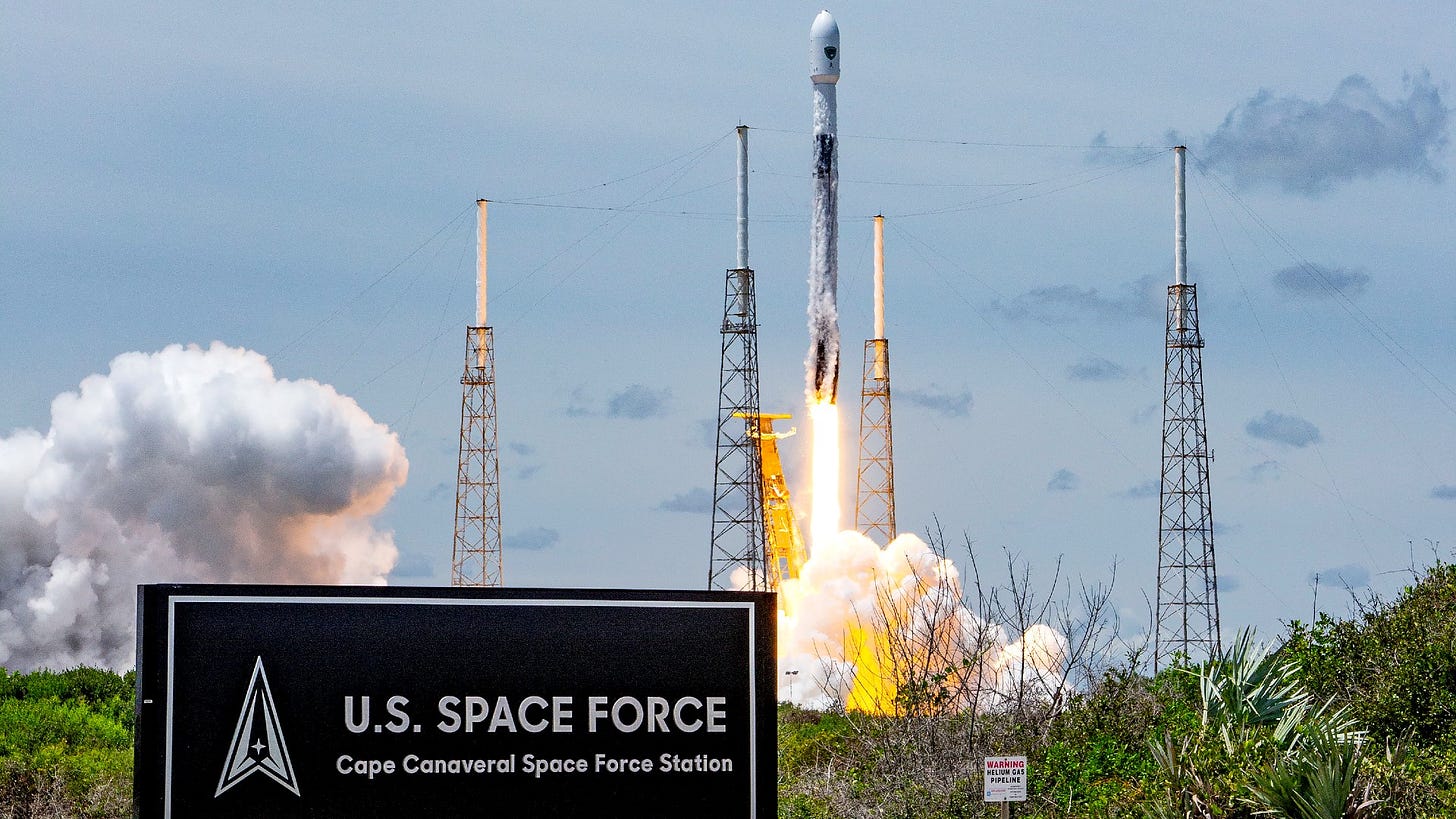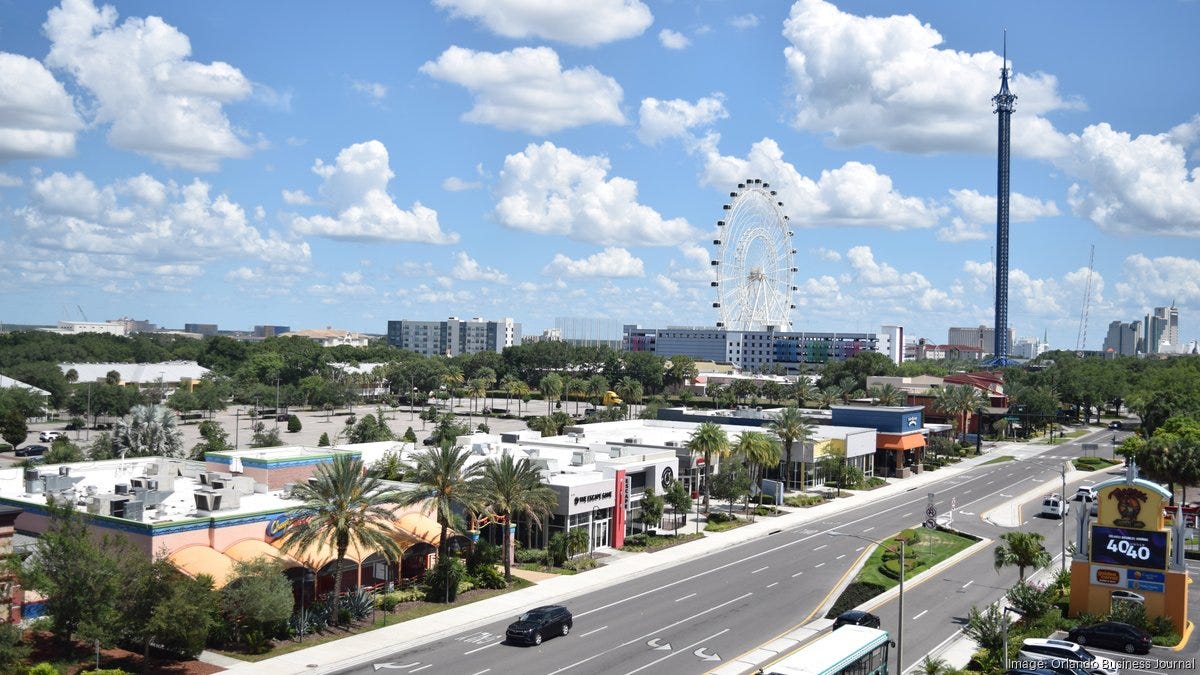State Budget Deal Reached, Averting Government Shutdown Risk & DeSantis Enacts Ban on Cellphone Use in Schools
June 2, 2025 - This Week's News from Central Florida
Welcome to this week’s edition of the Central Florida Times, an independent, reader-supported newsletter focusing on the Sunshine State. These are the most important stories you need to know from across Central Florida. To never miss an update, subscribe here:
Here’s the latest from Central Florida…
State Budget Deal Reached, Averting Government Shutdown Risk
The Republican-controlled Legislature reached a long-awaited budget agreement late Friday, resolving a weeks-long impasse that had threatened to delay the state’s fiscal planning and risk a government shutdown. The deal sets a framework for $2.25 billion in tax cuts and budget reserves while halting earlier efforts to permanently slash the state’s overall sales tax rate. The compromise follows a contentious standoff between House Speaker Daniel Perez (R-Miami) and Senate President Ben Albritton (R-Wauchula) over tax cuts and spending limits, which forced lawmakers to extend the regular session beyond early May. The final plan sets top-line spending levels that will be used to finalize a budget in June. Notably, the agreement does not include a permanent statewide sales tax rate cut, a measure previously championed by Speaker Perez but opposed by Governor Ron DeSantis. However, it does set forth eliminating the business rent tax and introducing targeted permanent sales tax exemptions for Florida families, though specifics are yet to be released. The budget framework also reserves $750 million for the state’s rainy-day fund and allocates $250 million annually toward debt reduction—a priority of Governor Ron DeSantis. Legislative leaders also plan to ask voters in 2026 to expand the state’s Budget Stabilization Fund cap, which serves as a financial safety net during economic downturns or emergencies, from 10% to 25% of general revenue collected. While full details on allocations for key areas like health care and education are pending, the framework ensures a "fiscally responsible, balanced budget that reduces state spending, lowers per capita spending, and reduces the growth of state bureaucracy," according to President Albritton. Budget conference meetings are set to begin Tuesday, with the goal of finalizing and voting on the complete budget by June 16.
DeSantis Enacts Ban on Cellphone Use in Schools
Governor Ron DeSantis signed House Bill 1105 into law on Friday, significantly expanding restrictions on cellphone use for students across Florida. Effective July 1, the legislation will ban cellphone use throughout the entire school day in elementary and middle schools. It also establishes a pilot program in six counties that will implement similar, full-day cellphone prohibitions in high schools. Previously, state law barred cellphone use during instructional time, but the new measure expands that limitation to any time during school hours for younger students. HB 1105, which passed the Legislature with strong bipartisan support, also encompasses several other education-related provisions, including changes to benefit charter schools. One provision mandates that charter schools receive a proportional share of local government infrastructure surtax revenues based on student enrollment. Furthermore, the bill eases the process for converting traditional public schools into charter schools by eliminating the requirement for majority teacher support, leaving only parental approval necessary for such conversions.
DeSantis Vetoes ‘Free Kill’ Medical Malpractice Law
Florida Governor Ron DeSantis on Thursday vetoed HB 6017, a bill that would have expanded the ability of families to seek non-economic damages in medical malpractice cases involving adult children and parents. The announcement was made during a press conference alongside Florida Surgeon General Dr. Joseph Ladapo. The bill, which overwhelmingly passed both chambers with bipartisan support, sought to repeal the state’s so-called ‘Free Kill’ law, which was enacted in 1990 and prohibits adult children (25 and older) from recovering non-economic damages—like pain and suffering—when a parent dies due to medical malpractice. It also bars parents from recovering such damages for adult children. The measure was hailed by families as a long overdue way to pursue civil recourse against doctors accused of medical negligence. However, the governor cited concerns that the measure would raise malpractice insurance costs, worsen physician shortages, and increase consumer healthcare prices. “We want accountability,” DeSantis said, “but we don’t believe there should be lawsuits all the time.” The American Tort Reform Association (ATRA) had publicly voiced opposition to the legislation and urged DeSantis to veto the bill for the potential harm it posed to the state’s medical and legal landscape. Citizens Against Lawsuit Abuse (CALA) also applauded the governor’s veto, crediting him with protecting Florida’s recent tort reform gains. CALA warned the bill could have unraveled efforts to curb litigation abuse and destabilized the healthcare system.
Immigration Arrests Soar in Central Florida, Placing Strain on Jail Capacity
A sharp jump in immigration arrests, driven by increased pressure from the Trump administration to intensify enforcement efforts, is causing significant strain on Central Florida's correctional facilities, particularly the Orange County Jail. Officials report a nearly 400% increase in immigration detainees held in the local jail this year compared to last, sparking fears that the facility could reach its maximum capacity. Orange Public Safety Director Danny Banks warned that this influx, including detainees from neighboring counties, threatens to "max out our jail space." Pinellas County is already experiencing similar constraints, with 200 inmates reportedly sleeping on floors due to the surge. In the past month alone, 267 individuals were booked into the Orange County Jail on immigration charges, exceeding the total from the previous four months combined. The Orange County Jail is one of seven in Florida authorized to hold Immigration and Customs Enforcement (ICE) detainees, meaning individuals arrested up to 100 miles away are brought there. In the Tampa Bay area, it is the Pinellas County jail that has a contract with ICE to serve as the region’s temporary holding facility for inmates held on immigration violations. They are typically housed here for about 24 hours before being transported to a federal immigration site in South Florida. As more local law enforcement agencies are deputized by federal authorities, officials expect arrest numbers to climb, further straining resources. As of last week, the Orange County Jail held 3,099 inmates against a 4,000-bed capacity. Counties are also facing a financial burden to house these inmates, as federal reimbursements fall short of actual housing costs, leaving taxpayers to cover the gap by almost 50%. Local sheriffs, including Pinellas Sheriff Bob Gualtieri and Polk Sheriff Grady Judd, are calling for all Florida jails to be authorized to house immigration detainees arrested in their respective counties, citing an "infrastructure problem" and lack of space. The State Immigration Enforcement Council has even proposed a 10,000-bed facility with federal funding to address the growing need.
Space Florida Explores Merging NASA and Space Force Operations at Cape Canaveral
As Florida leaders advocate relocating NASA headquarters to Brevard County, Space Florida is initiating a comprehensive study to examine the potential unification of NASA and U.S. Space Force operations at Cape Canaveral. Cape Canaveral Space Force Station (CCSFS) is owned by the U.S. Department of Defense and operated by the U.S. Space Force while Kennedy Space Center (KSC) is owned and operated by NASA. Space Florida President and CEO Robert Long announced the effort during a board meeting last week, saying the study will contribute to a new Cape Canaveral Spaceport master plan aimed at boosting efficiency and supporting the continued growth of commercial space activity. The plan will involve collaboration from both NASA and the Space Force. Gov. Ron DeSantis and several members of Florida’s congressional delegation have voiced support for relocating NASA’s Washington headquarters to the Space Coast, introducing legislation titled the Consolidating Aerospace Programs Efficiently (CAPE) Canaveral Act. Long emphasized that the study does not assume a “predetermined outcome” but will recommend a governance model that maximizes the spaceport’s capacity and minimizes inefficiencies. He estimated that $2–3 billion in infrastructure upgrades will be needed over the next decade as the site’s commercial use continues to expand. Cape Canaveral Space Force Station’s Space Launch Delta 45 (SLD 45), was the world’s busiest spaceport in 2024, with a record 93 rocket launches, including 67 from CCSFS and 26 from NASA's KSC.
Orlando’s Bold Pitch for Major League Baseball Focuses on Tourism
As Orlando steps up to the plate in its decades-long pursuit of Major League Baseball, the investment group behind pushing the proposal is seeking to leverage Orlando’s status as one of the nation’s top tourist destinations and its rapid population growth, arguing that the city offers a unique market for MLB expansion or relocation. The Orlando Dreamers, with significant financial support from Heartland Dental founder Rick Workman and attorney John Morgan, is hoping the $2.5 billion in investor commitments will further the city’s appeal for a team. This includes $1.5 billion for franchise acquisition or expansion fees and $1 billion for a new stadium on a proposed 35-acre site near SeaWorld and Aquatica. Orlando draws about 75 million tourists annually and is the largest U.S. media market without an MLB team, as well as one of the fastest-growing metro areas overall. The Dreamers say they can tap into the regular tourist influx to create an unparalleled ticket-buying reservoir that is unique in comparison to other markets. However, the path to bringing MLB to Central Florida remains complex. History shows that drawing tourists to regular-season baseball games, particularly on weekdays, has been a challenge for existing Florida teams in Miami and Tampa Bay, which consistently rank low in attendance despite significant tourism. Baseball also relies heavily on corporate season ticket sales, a different dynamic than the per-game ticket sales for other major sports. When considering expansion, the league would likely be reluctant to entertain extending a third struggling franchise to Florida over other attractive candidates such as Nashville, Charlotte, San Antonio, and Portland. Realistically, Orlando's hopes likely hinge on the potential relocation of the Tampa Bay Rays due to the uncertainty of their ballpark situation. However, MLB Commissioner Rob Manfred has expressed his preference for the Rays to remain in the Tampa Bay area, emphasizing the league's focus on finding solutions within the region. Adding to the hurdles, the Dreamers acknowledge that a public-private partnership must be demonstrated to meet MLB’s expectations, but obtaining public financing, particularly from a wary Orange County Commission, remains a hurdle. Governor DeSantis has also ruled out state funds for stadium construction, aside from any infrastructure investment. In bringing America's pastime to Central Florida, Orlando faces the challenging task of convincing MLB that the city’s unique tourism model can defy historical attendance trends and make a baseball team economically viable where others have struggled.
Epic Universe Fuels Hopes for Revitalization of North International Drive
As Universal’s Epic Universe theme park opens its gates, the City of Orlando is seizing the moment to revitalize the aging northern stretch of International Drive, aiming to spark new investment and economic growth. Just a few miles from the new $7.7 billion attraction, north I-Drive, an area long overshadowed by the flashier southern corridor, features a mix of older attractions, vacant lots, and dated businesses—a stark contrast to the bustling entertainment and hospitality hub further south. The City Council has recently approved a set of property tax incentives targeting underdeveloped properties north of Sand Lake Road. The goal is to attract mixed-use developments and affordable housing by enticing developers of eligible projects with up to a 50% refund on the city portion of their property taxes for 10 years, or an 80% refund if affordable housing for middle-income families is included. The incentives are designed to encourage high-quality development and investment along North I-Drive that matches the appeal of the more popular tourist strip to the south. Local business leaders and city officials hope the influx of visitors drawn by Epic Universe, which is expected to attract millions annually, will create demand for new hotels, retail, and entertainment, bridging the gap between the underdeveloped north and tourist-heavy south of International Drive. “We’re hoping that as Epic [Universe] increases visitors to I-Drive, a rising tide lifts all boats,” said Orlando City Commissioner Bakari Burns. The initiative targets parcels of at least 1.5 acres, with a city projection showing that a new apartment complex could net a $3 million refund over a decade. The incentive package complements ongoing redevelopment efforts, including proposals for the Fashion Square Mall site, which has faced ownership hurdles despite ambitious plans.
Brightline Draws Financial Scrutiny from Wall Street
Brightline, Florida's intercity passenger rail line connecting Miami, Orlando, and several South Florida cities, is aggressively expanding its marketing efforts to boost ridership and revenue amidst concerns from Wall Street bond-rating agencies. The company is introducing loyalty programs, revised commuter passes, and promotional fares, alongside partnerships with cruise lines and airlines, as well as increased commissions for travel advisors. Despite consistent year-over-year gains in ridership and revenue (April saw a 9% rise in ridership and a 15% overall revenue increase, particularly from long-haul Orlando trips), the railroad recorded a nearly $550 million net loss for 2024. This has led Fitch, Kroll Bond Rating Agency (KBRA), and S&P Global to downgrade over $4 billion in Brightline bonds and notes, citing "negative outlooks." Analysts express concern over the railroad's long-term ability to generate sufficient cash flow to service its substantial debt. Brightline management, acknowledging the need for capital, recently announced plans to raise equity financing this year to repay existing debt. While bond agencies highlight persistent operating losses, slower-than-expected ridership growth, and high fares relative to competitors, Brightline remains optimistic, pointing to the encouraging growth in long-distance travel and the rapid enrollment in its new rewards program. However, skepticism exists among the bond-rating agencies about the company’s ability to persuade drivers to drop their cars in favor of rail travel, citing competition from driving and existing low-cost rail alternatives.
Orlando International Airport Explores Air Taxi Integration
Orlando International Airport (MCO) is actively investigating the feasibility of integrating "Advanced Air Mobility" (AAM) vehicles, or air taxis, into its operations. Research conducted by Embry-Riddle University, sponsored by the Greater Orlando Aviation Authority, is examining how these electric vertical takeoff aircraft could safely and efficiently transport passengers, bypassing ground traffic to popular Orlando attractions and regional hubs. Researchers evaluated potential flight paths above or below existing routes to avoid interference with traditional air traffic. Simulations determined that the airport could handle at least 22 to 25 AAM flights within a short timeframe, highlighting the feasibility of implementation with continued innovation and coordination in the air mobility sector. The concept envisions quick, direct flights from busy areas like downtown Orlando, Disney World, and coastal communities to MCO.
Florida Attorney General Targets Hospitals Over Price Transparency
State Attorney General James Uthmeier has issued subpoenas to multiple hospitals across the state—including AdventHealth and Southern Baptist Hospital of Florida—in an effort to enforce compliance with state and federal price transparency laws. The move comes amid growing concern from patient advocacy groups and state officials over the lack of accessible pricing information in healthcare, including surprise billing and overcharging. “Patients are still consumers, and they deserve transparency,” Uthmeier said in a video statement Friday. He emphasized that failing to disclose pricing may qualify as an unfair and deceptive trade practice under Florida law. The subpoenas seek information on billing practices, patient disclosures, and adherence to surprise billing protections. Uthmeier said the investigation aligns with a Trump-era executive order signed in February 2025 mandating clearer healthcare pricing. Patient advocacy groups, such as the nonprofit PatientRightsAdvocate.org, have long campaigned for greater transparency, arguing that hidden prices allow hospitals to charge excessive amounts and force patients into "blank check" agreements. The group reports that only 29% of Florida hospitals were fully compliant with federal price transparency rules as of late 2024. Advocates are hopeful the investigation could help prevent predatory billing and give patients access to meaningful pricing data. Florida maintains a state-operated website, Florida Health Price Finder, to provide pricing information for common services.
St. Petersburg Concludes Decade-Long Sewage Lawsuit
The City of St. Petersburg has successfully fulfilled all court-mandated corrective actions stemming from a 2016 federal lawsuit, marking the resolution of a significant sewage crisis that plagued the city nearly one decade ago. The lawsuit, filed by Suncoast Waterkeeper and other environmental groups under the federal Clean Water Act, followed the discharge of approximately one billion gallons of wastewater from 2015 to 2016, with up to 200 million gallons entering Tampa Bay waterways. Under a 2018 settlement agreement, which integrated with a state consent order, St. Petersburg committed to comprehensive upgrades of its neglected sewage infrastructure, enhanced water quality testing, and improved public notification of spills. The city invested an estimated $300 million into these projects, encompassing repairs to sewer lines, pump stations, and the implementation of monitoring systems. Suncoast Waterkeeper confirmed to a federal judge on March 31 that the city has met its obligations, ending court-supervised compliance. The city still awaits final closure on the state's consent order and will address attorney's fees with the plaintiffs.
100+ Arrested in Immigration Sweep at Tallahassee Construction Site
Federal immigration agents, supported by state law enforcement, arrested more than 100 suspected undocumented migrants on Thursday during an immigration enforcement operation at a construction site near Florida State University in Tallahassee. The multiagency operation was led by agents from U.S. Immigration and Customs Enforcement (ICE), along with assistance from the FBI, Florida Highway Patrol, Drug Enforcement Administration, U.S. Marshals Service, and the Florida Department of Law Enforcement, who conducted the raid as part of what ICE described as an “ongoing investigation” in the region. Eyewitnesses, including family members and colleagues, observed workers being questioned and handcuffed before being placed on a bus with barred windows. Several of those detained were said to be longtime employees in the process of obtaining legal residency, including at least one who was believed to hold permanent U.S. residency. The detainees were identified as Nicaraguan, Venezuelan, Mexican, Colombian, El Salvadorian, Guatemalan, and Honduran nationals, among others, with some reported to have been previously deported and possessing criminal records. ICE authorities said the operation aimed “to eliminate illegal employment, holding employers accountable and protecting employment opportunities for America’s lawful workforce.” The raid is part of a broader immigration crackdown by the Trump administration with strong support from Governor DeSantis, who has encouraged state and local cooperation with federal deportation efforts. Through 287(g) agreements with Homeland Security Investigations (HSI), state agencies are now authorized to assist in federal immigration operations, including arrests and deportations. The Florida Legislature has also enacted several laws, signed by DeSantis, that criminalize undocumented status within the state. In May, the governor announced that 100 Florida Highway Patrol troopers have been deputized as U.S. Marshals, granting them authority to carry out immigration enforcement actions independently of federal agents.
Florida Lands $1B Aviation Manufacturing Investment
Northwest Florida has secured a $1 billion investment from Williams International to build a state-of-the-art high-volume aviation gas turbine engine manufacturing facility in Okaloosa County. The project, among the largest in the region’s history, is expected to create more than 330 high-tech jobs and will be constructed in three phases at the Shoal River Industrial Park. Gov. DeSantis celebrated the announcement as a major economic milestone, crediting the Florida Job Growth Grant Fund for helping lay the foundation. In 2022, the fund awarded $3.2 million to support regional manufacturing expansion. Williams International selected Florida following a nationwide site search. The project reflects strong collaboration among FloridaCommerce, CareerSource Florida, Space Florida, Okaloosa County, and Triumph Gulf Coast.
Osceola County’s Crossprairie City Center to Break Ground in 2026
Construction is set to commence in late 2026 on Osceola County’s Crossprairie, a 1,400-acre master-planned community east of Lake Toho. WMG Development has been selected to lead the long-anticipated 95-acre city center, marking the first major commercial project at the new Florida Turnpike interchange. The urban core development, named Heritage, will launch with a grocery-anchored plaza, two big-box stores, hotels, apartments, and a mix of retail, medical, and dining options. The first phase, expected to take five to seven years, sets the stage for a walkable, mixed-use hub tailored to meet current market demands and expand further with future growth. Subsequent phases could encompass up to 1,200 residential units, 600 hotel rooms, 200,000 square feet of medical/institutional space, and 2.7 million square feet of commercial and office space. WMG’s team, working with the City of St. Cloud, notes strong tenant interest from national brands and independent restaurants, signaling robust momentum within this burgeoning community.
Billionaire Buys $94M Beachfront ‘Dream’ Property in Manalapan, Florida
Billionaire David MacNeil, founder and CEO of WeatherTech, has finalized the acquisition of a prime lake-to-ocean lot in Manalapan, Florida, for $55.5 million in cash. This purchase brings his total investment to a remarkable $94 million for what he describes as a "bargain"—even before construction of his dream compound begins. The newly acquired parcel, which includes existing structures slated for demolition, is contiguous with another lot MacNeil bought last year for $38.5 million. Combined, the two properties will form a sprawling 3.6-acre estate boasting 340 feet of ocean frontage. MacNeil notes its unique distinction as the second-largest lot in Manalapan and one of the few in Palm Beach County with both Intracoastal and ocean access, drawing a parallel to President Trump’s Mar-a-Lago estate in Palm Beach. The seller of the recent $55.5 million lot was celebrity developer Joe Farrell. MacNeil plans to build a main residence, guesthouse, and garage for his vintage car collection on the site, emphasizing a "classy, not ostentatious" design. Construction of a sea wall is already underway, with the overall project estimated to be completed in two and a half years. Manalapan continues to attract billionaires and high-net-worth individuals, including Oracle co-founder Larry Ellison, singer-songwriter Billy Joel, and Fox News personality Sean Hannity, solidifying its sought-after, exclusive status.
Thanks for reading this edition of the Central Florida Times. To never miss an update, subscribe for free:
In the meantime, if you learned something or found this read interesting, please consider sharing it to grow our community!










